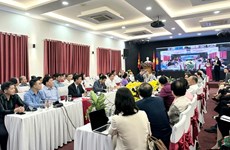ASEAN prepares road map on nutrition priority actions
ASEAN member countries gathered for a consultation in collaboration
with the UN’s Food and Agriculture Organisation (FAO) in Bangkok,
Thailand, on July 21-22 to finalise a road map of priority actions for
the implementation of a nutrition component for food security, the
Malaysian news agency Bernama reported.
ASEAN member countries gathered for a consultation in collaboration
with the UN’s Food and Agriculture Organisation (FAO) in Bangkok,
Thailand, on July 21-22 to finalise a road map of priority actions for
the implementation of a nutrition component for food security, the
Malaysian news agency Bernama reported.
The consultation’s objective is to integrate nutrition into the ASEAN Integrated Food Security Framework (AIFS) and the Strategic Plan of Action on Food Security (SPA-FS).
Speaking at the opening ceremony, FAO Assistant Director-General Hiroyuki Konuma said that FAO has been assisting ASEAN in developing and implementing AIFS and SPA-FS during 2015-2020.
“Nutrition is an important element in ensuring food security,” he said. “FAO is very pleased that ASEAN is placing nutrition as a priority and is leading the process of mainstreaming nutrition as an integral part of ASEAN AIFS and SPA-FS. This provides the basis for ASEAN to take a long-term, integrated and sustainable food system approach that will guide future actions on food security and nutrition”.
Konuma pointed out that all ten ASEAN countries had achieved the Millennium Development Goal to reduce the proportion of hunger by half by 2015 with an average rate of 9.6 percent, which is far lower than the regional average of 12 percent, and is a prime mover of Asia’s success
Recent data indicates that almost all countries in South East Asia have a high incidence of anaemia among pregnant women and children. Among pregnant women, the incidence ranges from 24 percent to 52 percent in some countries. Prevalence of anaemia among children below the age of five ranges from 18 percent to 55 percent in some countries.
Some of the key micronutrients typically deficient in the region are iron, vitamin A and iodine.-VNA
The consultation’s objective is to integrate nutrition into the ASEAN Integrated Food Security Framework (AIFS) and the Strategic Plan of Action on Food Security (SPA-FS).
Speaking at the opening ceremony, FAO Assistant Director-General Hiroyuki Konuma said that FAO has been assisting ASEAN in developing and implementing AIFS and SPA-FS during 2015-2020.
“Nutrition is an important element in ensuring food security,” he said. “FAO is very pleased that ASEAN is placing nutrition as a priority and is leading the process of mainstreaming nutrition as an integral part of ASEAN AIFS and SPA-FS. This provides the basis for ASEAN to take a long-term, integrated and sustainable food system approach that will guide future actions on food security and nutrition”.
Konuma pointed out that all ten ASEAN countries had achieved the Millennium Development Goal to reduce the proportion of hunger by half by 2015 with an average rate of 9.6 percent, which is far lower than the regional average of 12 percent, and is a prime mover of Asia’s success
Recent data indicates that almost all countries in South East Asia have a high incidence of anaemia among pregnant women and children. Among pregnant women, the incidence ranges from 24 percent to 52 percent in some countries. Prevalence of anaemia among children below the age of five ranges from 18 percent to 55 percent in some countries.
Some of the key micronutrients typically deficient in the region are iron, vitamin A and iodine.-VNA












